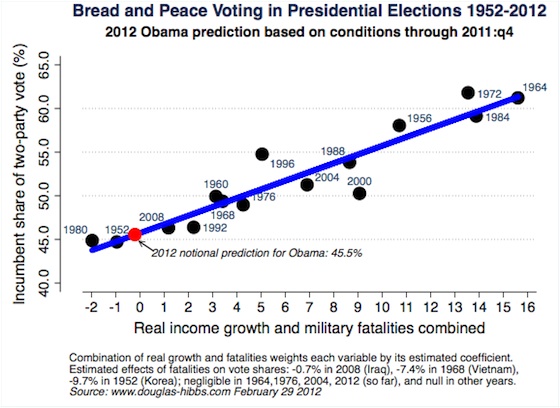Some conventional political observers give reasons such as the high unemployment rate, the majority who say the country is on the wrong track, and Obama’s below 50% job approval rating, as reasons why Obama’s re-election chances are dim.
As I wrote about yesterday, political science professionals discount those kinds of factors as superficial and lacking any empirical basis and see other reasons why Obama’s chances are dim. The ‘Bread and Peace’ model of Douglas Hibbs identifies the growth in real disposable income and war casualty rates as the key predictors of presidential outcomes. This model uses actual election results to get a best fit to four parameters.
As we see according to the model, Obama’s chances of winning the 2012 election at the moment look pretty poor. He needs to over-perform by about 4.5% in order to win, though if the economy improves during this year, that hurdle may become a little smaller.
What are the factors that might give Obama the 5% or so boost that he needs to overcome the odds? If he does do it, this election will be an outlier on this graph and so it is interesting to look at the other outliers and what might have caused them to see if the same factors might be at play this year. There are three other major outliers in the graph: the elections of 1972, 1996, and 2000.
1972 was when George McGovern ran against incumbent Richard Nixon. The odds were against McGovern from the beginning but the fiasco over his choice of vice-president and the chaotic party convention got his campaign off to a terrible start from which it never recovered and that may explain why Nixon over-performed by about 3%.
The election of 2000 is more intriguing. According to the model, Al Gore should have won easily with around 55% of the two-party vote but he got just 50.25%, losing in the electoral college after the Florida fiasco and the US Supreme Court’s intervention. Many Democrats blamed Ralph Nader’s third party candidacy but he got just 2.73% of the vote. Since the Republican ticket of Bush-Cheney was not particularly electrifying, it seems like Gore inexplicably underperformed.
A repeat of the 1996 election seems the best hope for Obama. Then too you had a Democratic incumbent who faced an opposition party that had won big in Congressional elections just two years earlier. Unlike this year though, the incumbent Bill Clinton was favored to win by the model. While there was a contested Republican primary with some early surprises, the party establishment coalesced around Bob Dole fairly quickly. The Republican ticket of Dole and Jack Kemp was not particular awful and did not do anything spectacularly disastrous that I can remember. They were just dull, so Clinton over-performing by getting a share of the vote that was so much larger than expected (by about 4%) is a surprise.
What other factors might Obama have going for him? One is that the Republican party seems to be doing its best to alienate huge swaths of voters. Its war on reproductive health issues is alienating women. Its strident anti-immigrant rhetoric is turning off Hispanic voters. And its disapproval of homosexuality and its prudery on sex is not doing it any favors with young people. All these things, and the heated rhetoric of the primaries, are increasing the negative perceptions of all of the Republican candidates, especially Mitt Romney.
The putative nominee Romney may have seemed like the perfect bland candidate to steer the Republican ship into the White House but he is turning out to be a thoroughly unlikable candidate. His phoniness is extraordinary, even for a politician, and he just cannot seem to avoid bringing up his wealth in ways that make him seem completely out of touch and his attempts at overcoming this and connecting with ordinary people are cringe-inducing for their awkwardness. His Mormon religion is not going to help with important segments of his party’s Christian nutter base. The awful way he treated his dog is also likely to come back and reinforce his image of being someone who seems almost robotic in his lack of normal human qualities.
He also seems to be an inveterate liar. One does not expect a high level of truthfulness in a politician but they are usually skillful in how they lie, either shading the truth, indulging in double talk, or allowing surrogates to lie on their behalf. Romney is remarkable for the number, brazenness, and ineptness of his lies. It is really quite extraordinary for someone who claims to be a devout Mormon. This may prove to be his main weakness since a good opponent can use these blatant lies to put him off balance and force him to keep explaining them away.
Are all these things enough to give Obama the 5% boost he needs? If they are and Obama does eke out a win, then this election will go down as one of the biggest upsets in modern US elections and the Republican party would be well-advised to do a thorough soul-searching as to what they did wrong.


Why does 1992 show the incumbent (George HW Bush) with ~47% when he received only 37.5% of the popular vote? Are independents not factored in?
If not, I’m not sure of the usefulness of the formula looking forward. With the current partisan environment Republics vote for their candidate, Dems vote for theirs, and the independents decide the election.
In 2008 the majority of independents went with Obama. If their current dissatisfaction with the president continues then his goose is cooked.
http://content.usatoday.com/communities/theoval/post/2012/02/obama-focus-independents-third-way/1#.T1-pseR0lnB
The model calculates the share of the incumbent vote based on the total votes cast for the two major parties. So Bush’s 37.5% of the actual vote came out to 47% of the combined Democratic and Republic votes.